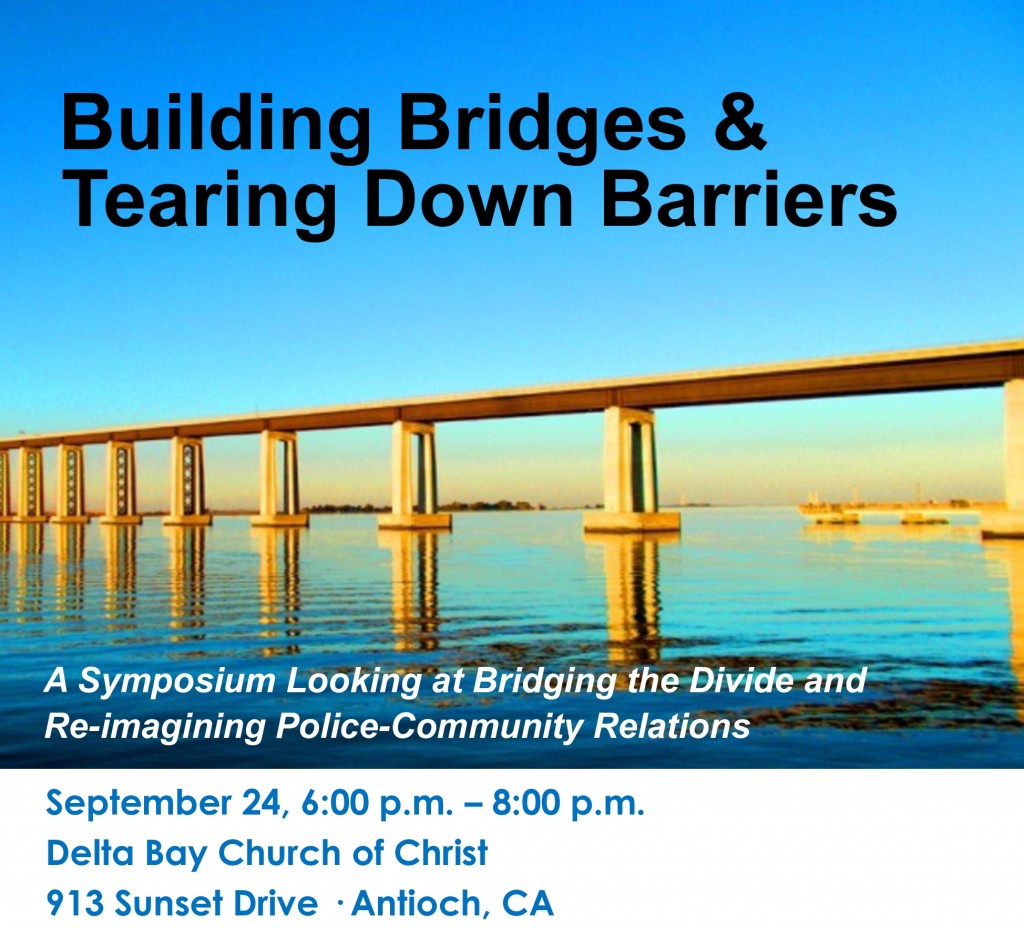New group of Antioch residents, ACT, to host symposium to discuss 21st Century Policing
 In light of well-publicized, hostile encounters with police in various communities across the United States, the recently formed Antioch Community Team (ACT) is hosting a public forum entitled Building Bridges and Tearing Down Barriers Symposium, before it happens here.
In light of well-publicized, hostile encounters with police in various communities across the United States, the recently formed Antioch Community Team (ACT) is hosting a public forum entitled Building Bridges and Tearing Down Barriers Symposium, before it happens here.
The symposium will be held on Saturday, September 24 from 6:00 p.m. to 8:00 p.m. at Delta Bay Church of Christ, located at 913 Sunset Drive in Antioch.
The primary goal of the symposium is to have a proactive, community dialogue that ensures trust among law enforcement and communities-at-large via a panel discussion with members of the policing community, as well as friends, neighbors and others from various communities.
Also sponsored by the Contra Costa Alumnae Chapter, Delta Sigma Theta Sorority, Inc. and Greatness Rediscovered in Our Time (G.R.I.O.T.), the symposium will explore how to strengthen relations between the community and law enforcement by opening lines of communication between both entities. The ACT team welcomes all to come together as one community and have a healthy dialogue about 21st Century Policing.
However, Antioch Police Chief Allan Cantando said both he and Captain Tammany Brooks are not available that night and will be unable to attend, nor will they be sending a representative from the Antioch Police Department.
In 2014, President Obama issued an Executive Order forming an 11-member Task Force on 21st Century Policing. His Executive Order stated the purpose: The Task Force shall, consistent with applicable law, identify best practices and otherwise make recommendations to the President on how policing practices can promote effective crime reduction while building public trust.
Over 90 days of hearing, input and testimony, the Task Force developed Six Pillars of 21st Century Policing and five ways each of three stakeholder groups can implement them.
The Six Pillars are: 1. Building Trust and Legitimacy; 2. Policy and Oversight; 3. Technology and Social Media; 4. Community Policing and Crime Reduction; 5. Training and Education; and 6. Officer Wellness and Safety.
The three stakeholder groups include local government, law enforcement and communities. According to the Implementation Guide, following are the five things each of three stakeholder groups can do to implement the Task Force’s recommendations:
Local government
1. Create listening opportunities with the community.
2. Allocate government resources to implementation.
3. Conduct community surveys on attitudes toward policing, and publish the results.
4. Define the terms of civilian oversight to meet the community’s needs.
5. Recognize and address holistically the root causes of crime.
Law enforcement
1. Review and update policies, training, and data collection on use of force, and engage
community members and police labor unions in the process.
2. Increase transparency of data, policies, and procedures.
3. Call on the POST [Police Officers Standards & Training] Commission to implement all levels of training.
4. Examine hiring practices and ways to involve the community in recruiting.
5. Ensure officers have access to the tools they need to keep them safe.
Communities
1. Engage with local law enforcement; participate in meetings, surveys, and other activities.
2. Participate in problem-solving efforts to reduce crime and improve quality of life.
3. Work with local law enforcement to ensure crime-reducing resources and tactics are being deployed that mitigate unintended consequences.
4. Call on state legislators to ensure that the legal framework does not impede accountability for
law enforcement.
5. Review school policies and practices, and advocate for early intervention strategies that minimize involvement of youth in the criminal justice system.
Please join the conversation.
Register for the free symposium to join the conversation on Eventbrite at www.eventbrite.com/e/building-bridges-tearing-down-barriers-symposium-tickets-27307531562?aff=eioscfrmshrefabk&ref=eioscfrmshrefabk
To learn more about 21st Century Policing, please click on the following documents and website:
http://www.cops.usdoj.gov/pdf/taskforce/taskforce_finalreport.pdf
http://www.cops.usdoj.gov/pdf/taskforce/Implementation_Guide.pdf
http://cops.usdoj.gov/policingtaskforce
To download a copy of the symposium flyer, click here: act-symposium-flier
For more information follow ACT on Facebook at www.facebook.com/AntiochCommunityTeam/
Allen Payton contributed to this report.
the attachments to this post:
act-symposium-flier
act-symposium-flier






















It’s great that the community is organizing such an event. But isn’t it telling that the Chief is NOT sending a representative from APD. That speaks volumes about an unwillingness on their part to engage with certain members and groups in the community. They pick and choose who they will treat respectfully and work closely with. What a disappointment. I’m glad that the group ACT is moving forward and I thank them for their efforts.
Daniel J.
I spoke with Chief Cantando about the event and he said he had spoken with representatives from ACT, before they finalized the event date, and told them that neither he nor Captain Brooks could attend that night and that he wanted only one of the two of them to represent the department, especially since Brooks attended a course on 21st Century Policing while in D.C. Cantando asked for the group to schedule it for another night. In response, the group decided to make the discussion at the symposium about the issues, in general and not focus it on what is happening in Antioch. There is a possibility that the group will hold a future symposium and discussion about Antioch.
Allen Payton, Publisher